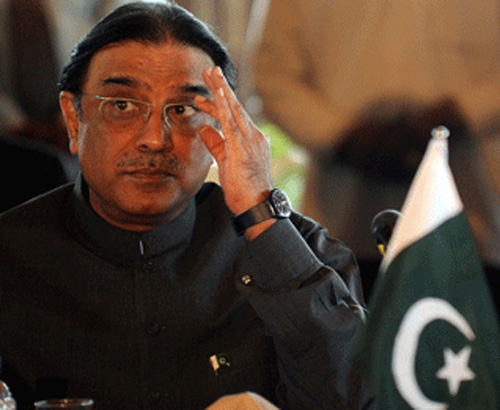Pakistan president has not offered to resign: PM
Pakistani President Asif Ali Zardari has not suffered a stroke nor offered to resign, Prime Minister Yousuf Raza Gilani told the BBC Sunday following rumours the unpopular head of state would step down.
The 56-year-old Zardari flew to the United Arab Emirates on Tuesday after falling ill in the midst of a major scandal over alleged attempts by a close aide to seek US help to limit the power of Pakistan's military.
"There was no stroke," Gilani said in an interview with the BBC World News.
"He is improving and he is now out of ICU and he has been shifted to his room and I think he will take rest for about two weeks," he said.
 This November 29, 2010 file photograph shows
Pakistan's President Asif Ali Zardari. (AFP PHOTO/Ishara S.KODIKARA/FILES)
This November 29, 2010 file photograph shows
Pakistan's President Asif Ali Zardari. (AFP PHOTO/Ishara S.KODIKARA/FILES)
Zardari has a long-standing heart condition and was admitted to the American Hospital in Dubai.
A cabinet member said earlier in the week that Zardari suffered a "minor heart attack" but a senior member of the Pakistan People's Party (PPP) told AFP on Friday that the cause was "most likely a transient ischemic attack", or mini stroke.
Medics say there is no lasting damage from a transient ischemic attack, but that it is an indicator of a possible stroke in the future.
Gilani also said he had talked with Zardari.
"He sounded very well. I did talk to him, and he has been talking to other cabinet ministers as well, to his son, to everybody," he said, adding that the president had been exhausted but was improving.
The president's admittance to hospital sparked fevered speculation on microblogging site Twitter that he may step down, but the prime minister denied Zardari had written a letter of resignation.
"Why should he write?" Gilani told the BBC. "He has the backing and support of the entire parliament."
Zardari is facing a major scandal over the extent to which he was involved in attempts to seek US help to limit the power of Pakistan's military.
Pakistan is also battling perhaps its worst crisis in US relations after NATO air strikes killed 24 Pakistani soldiers on November 26.
Gilani is responsible for the day-to-day running of the fragile coalition government, which is understood to have tense relations with the military, which effectively controls foreign policy.
Although Zardari has survived numerous crises and calls for his resignation, he is under huge pressure over a memo allegedly written by close aide Husain Haqqani asking for American assistance in curbing the powerful military.
The memo sent in May to the then US Chairman of the Joint Chiefs of Staff, Admiral Mike Mullen, sought help over fears of a military coup following the secret US raid that killed Osama bin Laden on May 2.
Mansoor Ijaz, an American businessman, accused Haqqani of crafting the memo with Zardari's support. Haqqani denied involvement, but was forced to resign last month and Zardari isdue to address a joint session of parliament.
-AFP/ac

